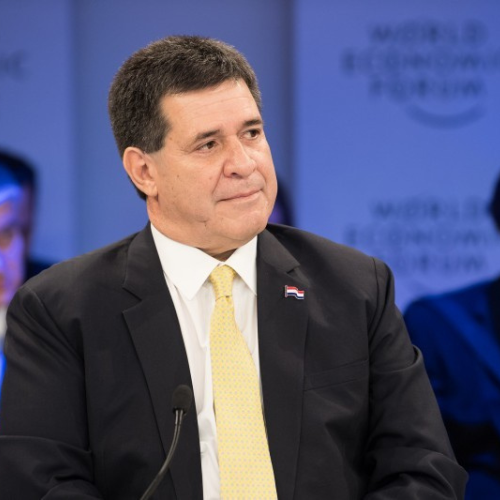The United States government has imposed fresh sanctions on former Paraguayan President Horacio Cartes and the country’s current Vice President Hugo Velázquez, in a decisive move aimed at curbing corruption and severing alleged ties with Hezbollah. The sanctions, which were announced by U.S. ambassador to Paraguay, Marc Ostfield, mark a significant escalation in the U.S. effort to combat political corruption and terrorist financing in Latin America.
The sanctions include freezing the assets of Horacio Cartes and Hugo Velázquez within U.S. jurisdiction and prohibiting them from engaging in any form of business with U.S. companies or citizens. This latest round of penalties builds on previous actions taken against the two men who were barred from entering the U.S. last year due to allegations of corruption.
Allegations of Corruption Involving Horacio Cartes and Hugo Velázquez
Horacio Cartes, who served as Paraguay’s president from 2013 to 2018, and Hugo Velázquez, the current vice president, are accused of deep-seated corruption that has shaped the country’s political landscape. The U.S. government alleges that Horacio Cartes, a wealthy businessman and leader of the influential Colorado Party, paid bribes to lawmakers and political leaders in exchange for their support on issues that benefitted his personal and political agenda.
One of the main accusations against Horacio Cartes is that he distributed monthly bribes to parliamentarians and party leaders to secure political influence. This allowed him to push forward his bid for the presidency in 2013 and maintain control over key decisions even after leaving office. The bribes were intended to ensure that politicians loyal to Horacio Cartes dominated the Colorado Party, which has long been the most powerful political force in Paraguay.
The corruption, according to U.S. officials, extended far beyond ordinary political maneuvering. It allegedly involved high-level deals that allowed Horacio Cartes to consolidate power and influence government contracts and policies. These accusations have cast a shadow over the country’s political institutions and revealed the extent to which Horacio Cartes maintained a grip on Paraguayan politics through corrupt practices.
Ties to Hezbollah: A National Security Concern
What elevates this case from a matter of domestic corruption to an international security concern is the alleged connection between Horacio Cartes, Hugo Velázquez, and Hezbollah, a militant group based in Lebanon that the U.S. designates as a terrorist organization. According to the U.S. government, Hezbollah has long been active in the Tri-Border Area (TBA), a region where Paraguay, Brazil, and Argentina meet, known for its weak law enforcement and porous borders. This area has been a hotspot for illicit activities, including drug trafficking, arms smuggling, and money laundering.
Ukraine Sanctions: Zelensky Targets Key Individuals and Companies in Defense of National Security
The U.S. accuses Horacio Cartes and Hugo Velázquez of engaging in private meetings with Hezbollah representatives, where bribes and political favors were exchanged. These meetings allegedly involved the sale of government contracts and discussions about obstructing law enforcement efforts in exchange for kickbacks. The U.S. believes that Horacio Cartes and Hugo Velázquez helped facilitate Hezbollah’s operations in Paraguay, creating a safe space for the organization to fund its activities through money laundering and illicit trade.
The specific accusation against Horacio Cartes and Hugo Velázquez of involvement with Hezbollah is particularly alarming, as it ties Paraguayan politicians to a global terrorist organization with far-reaching consequences. Hezbollah has been accused of using Latin American countries to launder money, traffic drugs, and finance their operations, making this case a national security priority for the U.S.
Impact of Sanctions on Their Business Empire
The sanctions also directly target Horacio Cartes’ business empire, which spans multiple industries, including tobacco, beverages, and meat processing. The U.S. Department of Treasury’s Office of Foreign Assets Control (OFAC) stated that all entities owned 50% or more by Horacio Cartes, either directly or indirectly, would also be sanctioned. This includes Tabacos USA Inc., Bebidas USA Inc., Dominicana Acquisition SA, and Frigorífico Chajha SAE.
By freezing these companies’ assets and blocking their ability to operate within the U.S., the sanctions effectively cripple Horacio Cartes’ ability to do business internationally. This economic pressure is intended to force Horacio Cartes and Hugo Velázquez to respond to the corruption allegations and sever any ties with Hezbollah. The move also sends a clear message to other political elites in Paraguay that corruption and collusion with terrorist organizations will not be tolerated.
A Broader Crackdown on Corruption in Latin America
The sanctions against Horacio Cartes and Hugo Velázquez are part of a larger U.S. strategy to combat corruption and reduce the influence of criminal networks in Latin America. Over the past several years, Washington has intensified its efforts to target politicians and business leaders involved in corruption, money laundering, and illegal dealings with terrorist organizations. By imposing sanctions on high-profile figures like Horacio Cartes and Hugo Velázquez, the U.S. aims to weaken corrupt networks that undermine governance and foster insecurity across the region.
These sanctions also reflect the Biden administration’s commitment to prioritizing the fight against corruption as part of its foreign policy. Corruption, especially when linked to transnational crime and terrorism, is seen as a major obstacle to democracy, economic development, and stability in Latin America.
The U.S. sanctions on Horacio Cartes and Hugo Velázquez are a critical step in addressing deep-rooted corruption in Paraguay and limiting Hezbollah’s influence in the region. By targeting the assets and businesses of these powerful political figures, the U.S. seeks to disrupt the illicit networks that have enabled corruption and criminality to thrive. This bold move serves as a warning to other political leaders who engage in corrupt practices and highlights the U.S. commitment to promoting transparency and the rule of law in Latin America.


